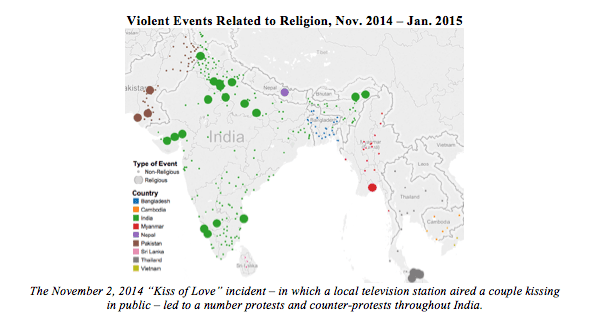Categories
New Dataset on Conflict Trends in South and Southeast Asia
Mar 26, 2015 | CEPSA
The Armed Conflict Location and Event Data Project (ACLED) has released a new dataset of political violence in South and Southeast Asia as a part of the Strauss Center’s new program analyzing the drivers of complex emergencies and political stability in Asia.
ACLED provides policy makers, journalists, and researchers with real-time data on political conflict by tracking the date, agents, location, and types of violent events. Unlike other conflict datasets, ACLED includes a wide variety of types of political violence, including protests, drone attacks, and riots in addition to acts of war by governments and militias. The dataset, run by Strauss Center associate and CEPSA researcher Clionadh Raleigh of the University of Sussex, began by tracking political violence in Africa, and now provides real-time data continent-wide in Africa, updated on a weekly basis.
“By expanding the existing framework to Asia, ACLED enables users to compare violence types across different political and geographic conditions, identifying trends and points of departure,” said Professor Raleigh.
The expansion is a part of the Strauss Center’s Complex Emergencies and Political Stability in Asia Program (CEPSA), which assesses the drivers of insecurity in Asia and potential points of intervention for strengthening government capacity to respond. ACLED data assist in this endeavor by elucidating how conflict types, actors, and triggers differ across the countries in the study; identifying conflict clusters and areas of regional overlap; and providing researchers with the tools to understand causal connections between conflict and state fragility.
“ACLED’s expanded dataset breaks important new ground, facilitating analysis of the implications of complex disasters for the stability of the region as a whole,” said Professor Robert Chesney, Director of the Strauss Center.
The eleven countries included in ACLED’s expansion to Asia include Bangladesh, Bhutan, Cambodia, India, Laos, Myanmar, Nepal, Pakistan, Sri Lanka, Thailand, and Vietnam. ACLED will release real-time conflict data for these countries on a monthly basis. Data from January and February 2015 in each of the eleven countries, along with the codebook and user guide, is now available on the CEPSA website: www.strausscenter.org/acled.
Along with monthly real-time data updates, ACLED will publish quarterly Asian Conflict Trends briefs and regular country reports with visual aids to identify trends over time and by region, regarding violence type, perpetrators of violence, and event clustering.
In the first issue of Asian Conflict Trends, ACLED researchers introduce the conflict environments and profiles of five of the eleven countries included in the expansion: Pakistan, Myanmar, Nepal, Bangladesh, and Sri Lanka. In addition, the report includes a discussion of resource-based unrest in Pakistan, India, Myanmar, and Thailand, and the rise of Hindu radicalism in India.

In the coming months, ACLED will expand the Asia dataset by back-coding conflict events in all states to 2010 and, in some states, to 1997. The dataset currently contains information on 3,982 violent events derived from 166 unique sources.
The CEPSA program is a collaborative research program based at the Robert S. Strauss Center for International Security and Law at the University of Texas at Austin, conducted in partnership with ACLED, Development Gateway, and the University of California, Berkeley. CEPSA is funded by the U.S. Department of Defense’s Minerva Initiative, a university-based, social science research program focused on areas of strategic importance to national security policy. For more information about CEPSA, please visit www.strausscenter.org/cepsa.


